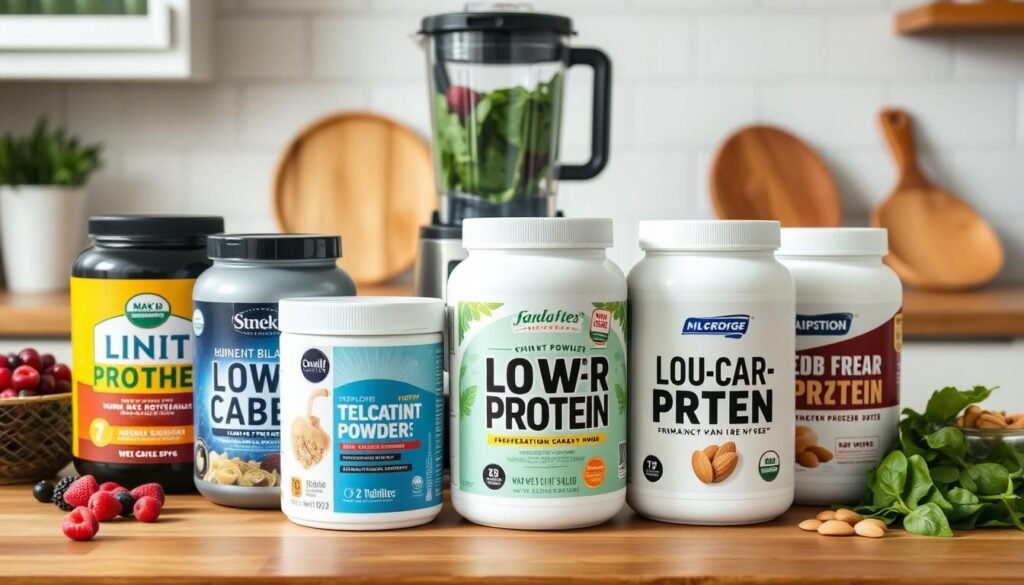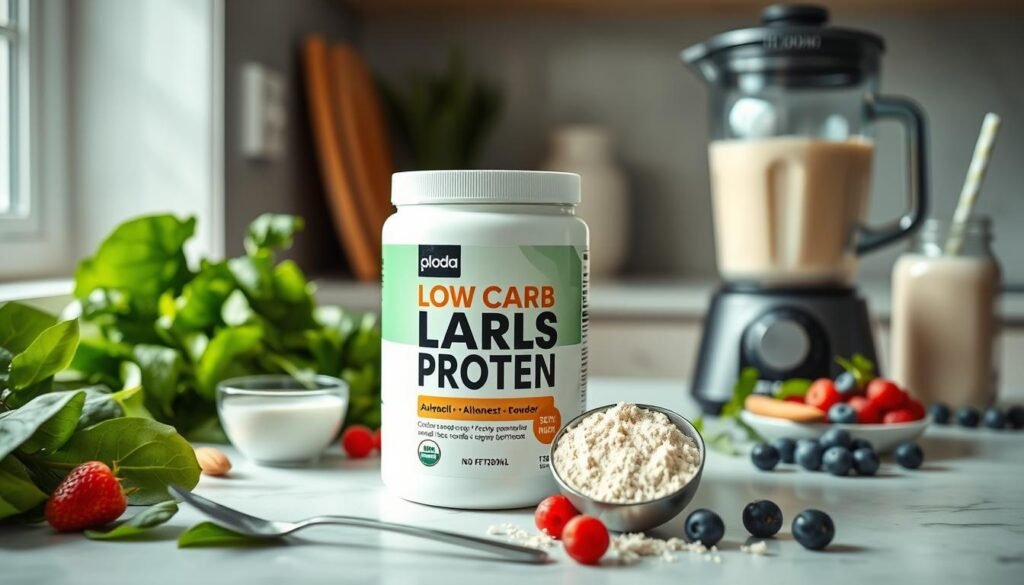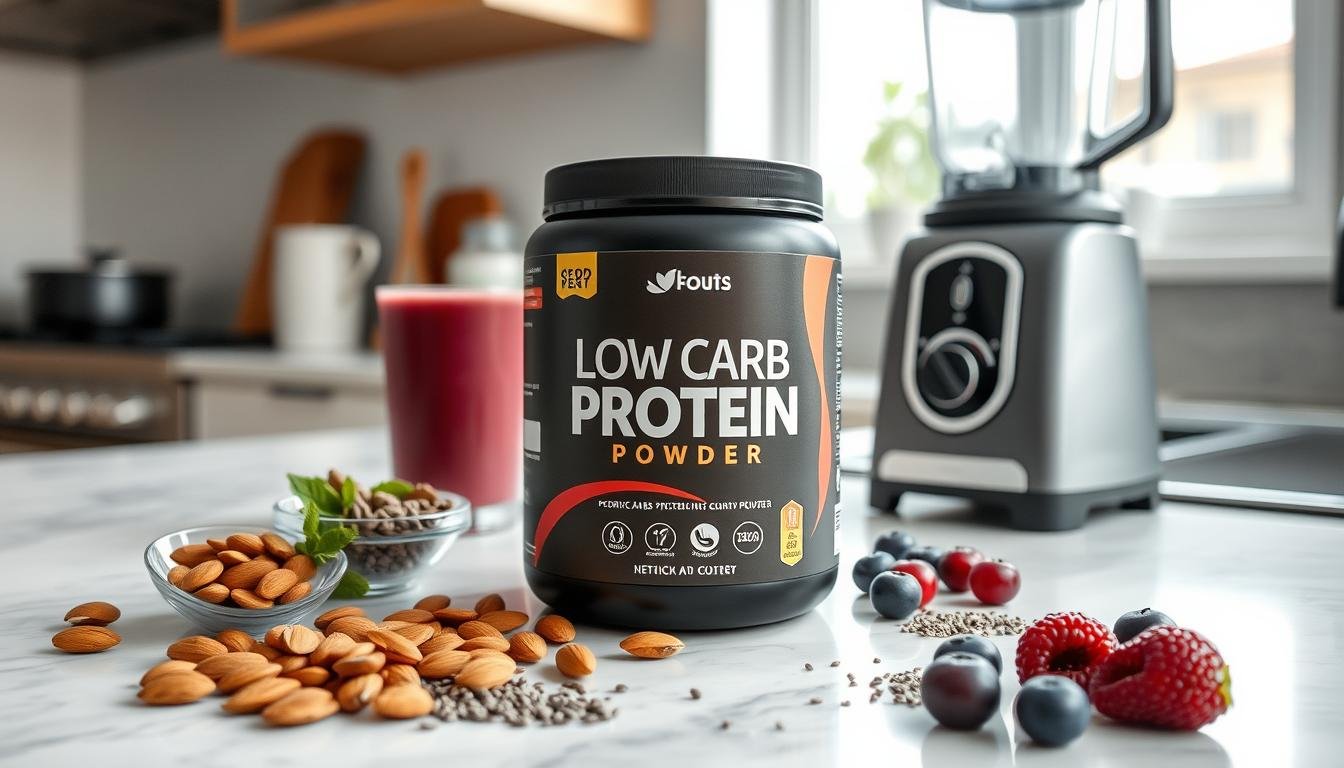Exploring low carb protein powder, I find many options. Brands like Transparent Labs offer 28 grams of protein per serving. This makes it perfect for those wanting a high protein, low carb powder. With more people focusing on health, the demand for low carb protein powder is growing. It’s key to know the benefits and types to choose wisely.
The right low carb protein powder can help reach fitness goals. I’ll look at different options, including Nutricost’s 25 grams of protein per serving.
Low carb protein powder is great for increasing protein without too many carbs. I’ll talk about top choices like Transparent Labs and Nutricost. They offer high-quality products. Knowing the benefits and types helps make a smart choice and unlock the power of low carb protein powder.
Key Takeaways
- Low carb protein powder is an excellent option for those looking to boost their protein intake without consuming too many carbohydrates.
- Transparent Labs offers 28 grams of protein per serving, making it an ideal choice for those seeking a high protein low carb powder.
- Nutricost provides 25 grams of protein per serving, with a price range of $0.78 to $0.99 per serving.
- Low carb protein powder can help individuals achieve their fitness goals, and it’s essential to choose the right product.
- The best low carb protein powder should have a minimum of 20 grams of protein per serving, according to the standard for low-carb protein powders.
- Individuals should consider factors like nutrition labels, ingredients, and taste when selecting a low carb protein powder.
What Is Low Carb Protein Powder?
Low carb protein powder is a supplement that offers a lot of protein but not much carb. It comes in different types, like whey, casein, and plant-based options. These are made from various sources and help with muscle growth and recovery.
Whey, casein, and plant-based proteins like pea, rice, and hemp are common in these powders. They’re great for athletes and bodybuilders. They also help those on a low-carb diet.
When picking a low carb protein powder, check the ingredients and nutritional info. Choose ones that are low in carbs and high in protein from quality sources. Also, look at the brand’s reputation, customer feedback, and certifications like gluten-free and vegan.
Benefits of Low Carb Protein Powder
Low carb protein powder is great for weight loss diets. It has lots of protein and not much carb. This helps with losing weight and getting healthier. It also boosts energy, helps muscles recover, and aids in weight loss.
It’s easy to get enough protein with a high protein low carb powder. Low carb diets also lower blood pressure and insulin levels a lot. Here are some main benefits of low carb protein powder:
- Supports weight loss and improves overall health
- Provides a high amount of protein for muscle recovery and growth
- Can help improve energy levels and enhance workout efficiency
- May help reduce cravings for sweet foods and improve concentration
Low carb protein powder is a good choice for those wanting to lose weight and get healthier. It has lots of protein and not much carb. This helps with losing weight and recovering muscles.
| Benefit | Description |
|---|---|
| Weight Loss | Supports weight loss and improves overall health |
| Muscle Recovery | Provides a high amount of protein for muscle recovery and growth |
| Energy Levels | Can help improve energy levels and enhance workout efficiency |
Popular Brands of Low Carb Protein Powder
There are many brands to choose from when looking for low-carb protein powder. Quest Nutrition, Isopure, and Orgain are some of the most popular. They offer high-quality powders that are low in carbs and rich in protein, perfect for a low-carb keto diet.
Quest Nutrition has a range of low-carb protein powders, like Quest Protein Powder. Isopure offers a low-carb whey protein isolate powder. Orgain has organic protein powders, including a low-carb plant-based option.
When picking a low-carb protein powder, look at the protein, carbs, and calories. Adults in the U.S. eat about 80 grams of protein daily, more than needed. Also, consider the price, which can range from $1.50 to $2.00 per serving.

Transparent Labs Whey Protein Isolate has 28g of protein per serving, with 0-3g carbs and 120-150 calories. Xwerks Grow Protein Powder has 25g of protein, 1-2g carbs, and 110 calories. Legion Whey Isolate Protein Powder offers 23g of protein, 2-6g carbs, and 100-130 calories.
How to Choose the Right Low Carb Protein Powder
When picking a low carb protein powder, always read the nutrition label and check the ingredients. Look for one that’s low in carbs and high in protein. It should also taste good and mix well with your drink of choice.
Here are some key things to think about:
- Nutrition labels and ingredients: Check the amount of protein, carbohydrates, and other nutrients in each serving.
- Taste and mixability: Choose a protein powder that has a pleasant taste and mixes well with your preferred beverage.
Some top picks include Isolucid, Emerge Plant-Based Protein, and Evolve Lipo Whey. They offer about 30 grams, 20 grams, and 24 grams of protein per serving, with under 2 grams of carbs. Look for at least 20 grams of protein and less than 2 grams of carbs per serving.
Remember, the minimum protein needed is about 0.8 grams per kilogram of body weight. Protein helps keep muscles strong when you’re cutting calories. By picking the right low carb protein powder, you can help reach your fitness goals and stay healthy.
Low Carb Protein Powder vs. Regular Protein Powder
Choosing between low-carb and regular protein powders depends on several factors. The main difference is in carbs. Low-carb powders have much less carb than regular ones. This makes them great for those on a low-carb diet or managing blood sugar.
Low-carb powders also have more protein and use better sources like whey isolate or casein. This is good for those wanting more protein without extra carbs. Brands like Quest Nutrition and Isopure offer many flavors with different protein and carb levels.
Here’s a look at what’s in low-carb and regular protein powders:
| Product | Protein Content | Carbohydrate Content |
|---|---|---|
| Low-Carb Protein Powder | 25-30 grams per serving | 5-10 grams per serving |
| Regular Protein Powder | 20-25 grams per serving | 20-30 grams per serving |
In summary, low-carb protein powder is perfect for those wanting more protein and less carbs. It’s great for low-carb diets or blood sugar control.
How to Incorporate Low Carb Protein Powder into Your Diet
Adding low carb protein powder to your diet is simple and convenient. A favorite way is to blend it into smoothies and shakes. Just mix the powder with your favorite drink and add fruits or nuts. You can also use it in cooking and baking, like in pancake or waffle batter, or to make protein-rich treats.
When picking a low carb protein powder, look at the nutritional content and ingredients. Choose a powder that’s rich in protein but low in carbs and fat. Popular options include whey, soy, and egg-based powders. You can also use it to make protein-packed meals and snacks, like bars and shakes.
Here are some tips for adding low carb protein powder to your diet:
- Mix it with your favorite beverage, such as water or almond milk
- Add it to smoothies and shakes for an extra boost of protein
- Use it in cooking and baking to make protein-rich meals and snacks
- Choose a powder that is high in protein and low in carbohydrates and fat

By adding low carb protein powder to your diet, you support your fitness and health goals. Make sure to pick a high-quality powder that fits your nutritional needs and tastes. With its ease of use and versatility, low carb protein powder is a fantastic addition to any diet.
Potential Side Effects of Low Carb Protein Powder
It’s important to know the possible side effects of low carb protein powder. Some people might feel bloated, gassy, or have stomach cramps because of its high protein. Also, those with dairy allergies or intolerances could have allergic reactions.
Eating a lot of protein might put extra work on your kidneys. But, research shows it’s usually okay for healthy people. Yet, it could be bad for people with kidney disease. Always talk to a doctor before starting a new diet or supplement, even more so if you have health issues.
Low-carb, high-protein diets can lead to bad breath, headaches, and constipation. To avoid these, choose foods high in fiber and nutrients like whole grains, veggies, and fruits. Eating a variety of proteins, like soy, beans, nuts, fish, lean chicken, and low-fat dairy, is good for your health.
| Potential Side Effect | Description |
|---|---|
| Digestive Issues | Bloating, gas, stomach cramps |
| Allergic Reactions | Dairy allergies or intolerances |
| Kidney Damage | Increased workload on kidneys, potential damage in individuals with existing kidney disease |
The Role of Low Carb Protein Powder in Fitness
As a fitness enthusiast, I know how important low carb protein powder is. It gives me energy and endurance before a workout. After exercising, it helps my muscles recover and grow, making me feel better and perform better.
When picking a low carb protein powder, look at what’s inside. Choose one with lots of protein and few added sugars or fillers. Whey protein concentrate and isolate are good choices because they have a lot of protein.
Here are some benefits of using low carb protein powder in fitness:
- Pre-workout fuel to increase energy and endurance
- Post-workout recovery to promote muscle growth and reduce soreness
- Convenient and efficient way to meet daily protein needs
Protein powder sales hit $4.14 billion in 2018. A 2020 review found that whey protein can help adults lose weight and body fat. Another review from 2020 said that eating more protein than usual can help with weight loss and better body shape.
| Protein Source | Protein Content (g) |
|---|---|
| 3 oz chicken | 24 |
| 3 oz pork tenderloin | 23 |
| 1 cup black beans | 15 |
In conclusion, low carb protein powder is great for fitness lovers. It’s easy to use and helps fuel your body before and after working out. By picking a high-quality powder, you can help your muscles grow, feel less sore, and perform better.
Low Carb Protein Powder for Meal Replacement
Looking into low carb protein powder as a meal substitute is key. It must be effective and balanced in nutrients. A good low carb protein powder can offer the right mix for a meal, perfect for those with tight schedules or specific diets. shows some powders have 80% whey protein isolate and 20% micellar casein, giving 22 grams of protein per scoop.
It’s also important to look at the overall nutrient balance. A good keto protein powder should have few carbs and lots of healthy fats and protein. mentions a shake with 20g of Tri-Phase Protein, 5-6g of prebiotic fiber, and only 1-3 grams of sugar per serving. This makes it a great choice for a low-carb meal.
When picking a low carb protein powder for meals, think about these points:
- Protein content: Aim for a powder with at least 20g of protein per serving.
- Carbohydrate content: Opt for a powder with little to no carbs per serving.
- Fiber content: A meal replacement with 5-6g of prebiotic fiber per serving can help control hunger.
By focusing on these aspects and choosing a well-made low carb protein powder, you can use it as a meal substitute. This supports your health and wellness goals.
Recipes Utilizing Low Carb Protein Powder
Low carb protein powder is great for many recipes, making it easy to add to your diet. You can make protein pancakes by mixing it with almond flour, eggs, and other ingredients. You can also make low carb protein bars by mixing it with nuts, seeds, and other ingredients.
When picking a low carb protein powder, look at its nutritional content. Brands like Isopure and Orgain have powders with low net carbs and no added sugars. You can also use these powders to make healthy snacks like protein balls or energy bars.
Here are some tips for using low carb protein powder in your recipes:
- Start with a small amount and adjust to taste
- Mix with other ingredients to create a balanced flavor
- Experiment with different brands and types of protein powder
Some popular recipes that use low carb protein powder include:
| Recipe | Ingredients | Net Carbs |
|---|---|---|
| Protein Pancakes | Low carb protein powder, almond flour, eggs | 5g |
| Low Carb Protein Bars | Low carb protein powder, nuts, seeds | 2g |
Always check the nutritional content of your ingredients. Adjust the recipe to fit your daily carb limit.
FAQs About Low Carb Protein Powder
Many people have questions about low carb protein powder. One big question is how much to take. The right amount depends on your needs and goals. Usually, 1-2 scoops a day is a good starting point.
Another question is if you can use it on a keto diet. Yes, you can, as long as you pick a low carb keto protein powder. It should have less than 5 grams of net carbs per serving.
When picking a low carb protein powder for keto, consider a few things. Look for one that’s low in carbs and made from keto-friendly sources like whey protein isolate or casein protein. Make sure it has no added sugars or artificial sweeteners. Also, check the nutritional label to see if it fits keto macronutrient ratios, which aim for carbs to be 5-10% of daily calories.
By choosing a high-quality low carb keto protein powder and following the recommended dosage, you can support your keto diet and fitness goals. You’ll also enjoy benefits like reduced cravings and feeling fuller longer.
| Protein Powder Type | Carbohydrate Content | Protein Content |
|---|---|---|
| Whey Protein Isolate | 1 gram per serving | 25-50 grams per serving |
| Casein Protein | 2-3 grams per serving | 20-30 grams per serving |
Conclusion: Making the Best Choice
Low-carb protein powders can help you reach your health and fitness goals. They are great for losing weight, building muscle, or increasing protein intake. Adding a high-quality low-carb protein powder to your diet can really help.
When picking the best low-carb protein powder, think about the carbs and ingredients. Also, consider your dietary likes and needs. Choosing a trusted brand that fits your needs can help you get the most out of low-carb protein powder.
Success with low-carb protein powder comes from being consistent and careful. Try to get 20 to 30 grams of protein each day. Also, watch the overall nutrients in your diet. Using low-carb protein powder can help with weight, muscle recovery, and keeping your body healthy.
So, look into different low-carb protein powders to find the right one for you. With the right choice, you can use this supplement to reach your fitness goals with confidence.


Leave a Reply